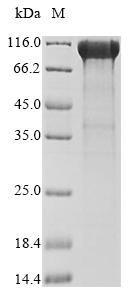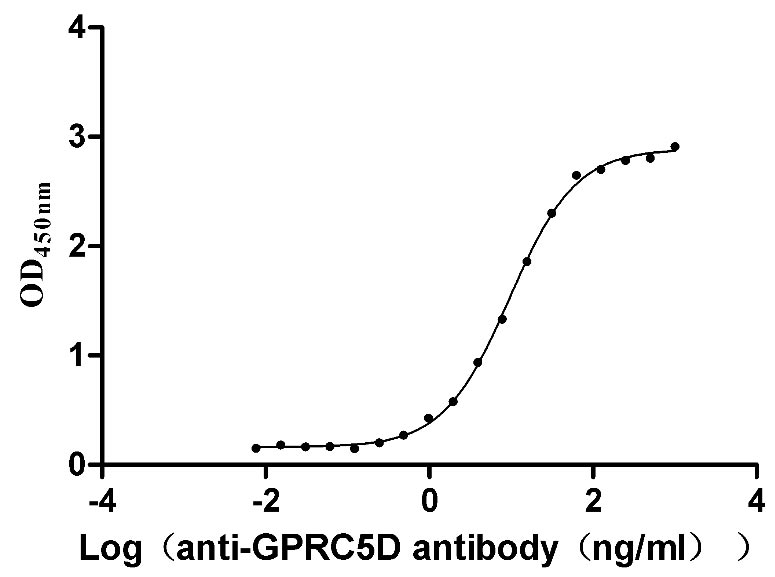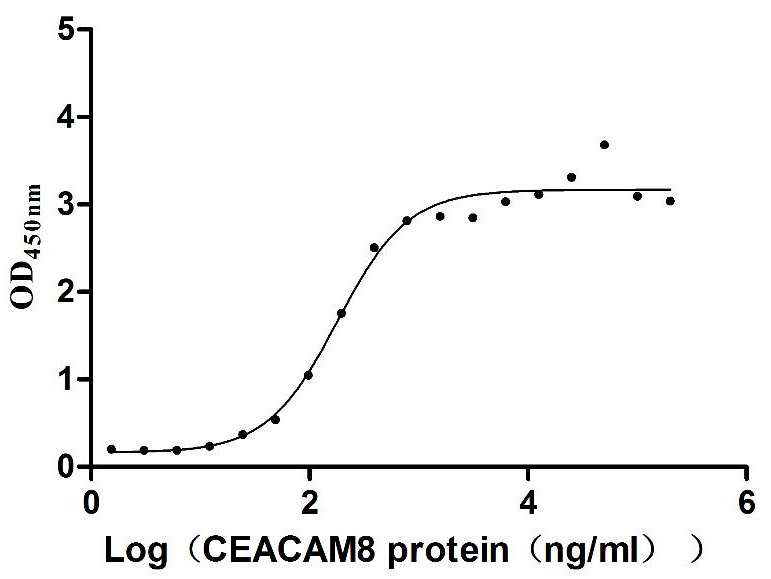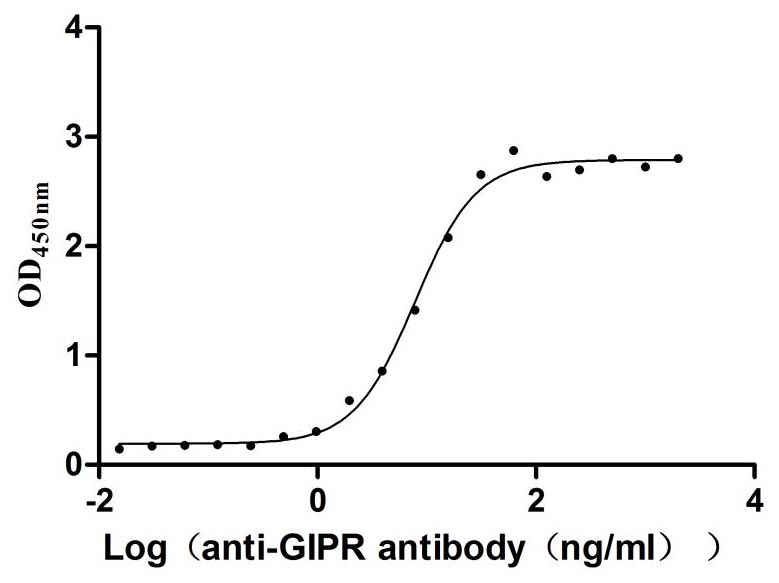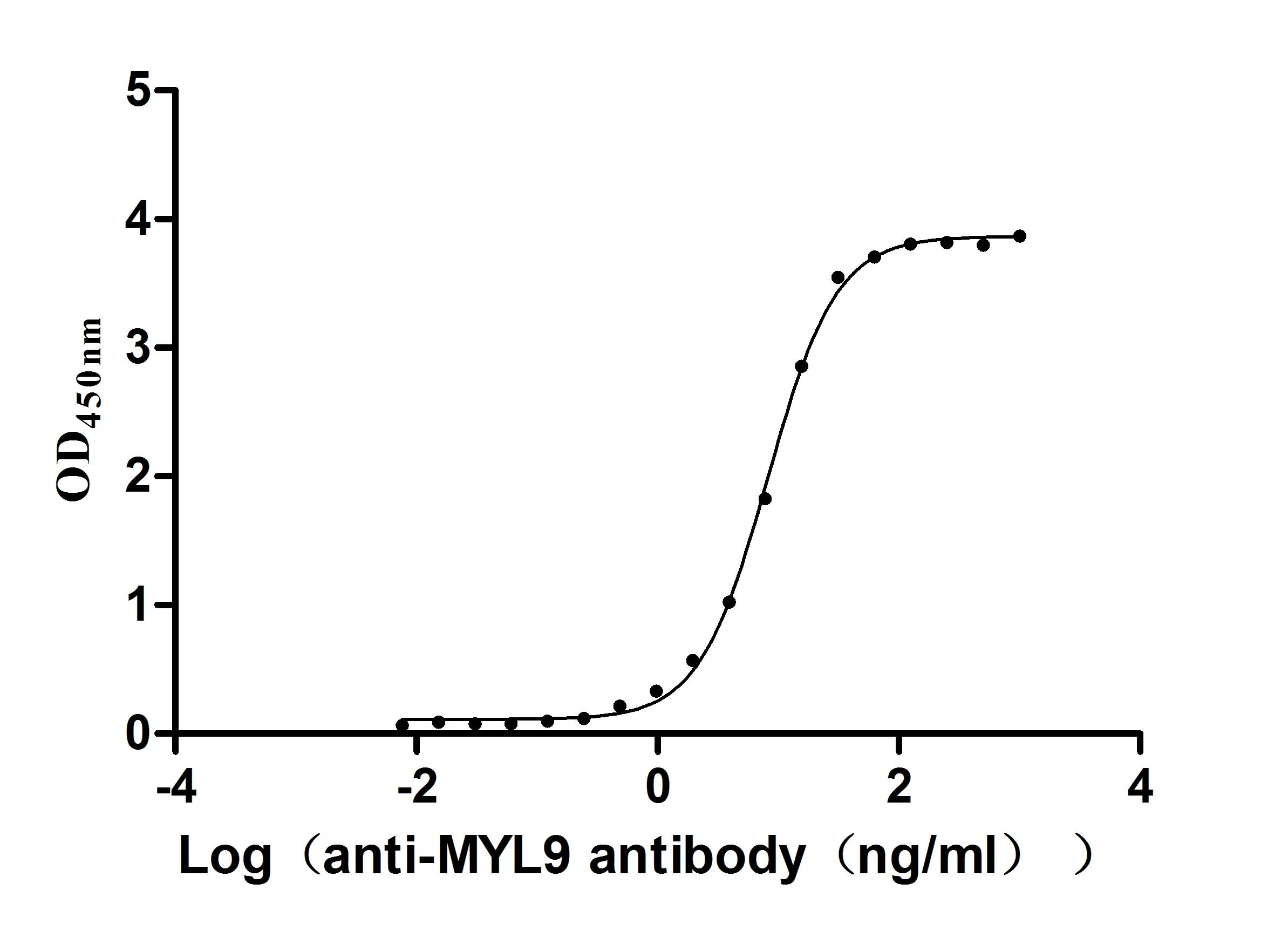Recombinant Human Chondroitin sulfate proteoglycan 4 (CSPG4), partial
In Stock-
货号:CSB-MP006076HU
-
规格:¥3960
-
图片:
-
其他:
产品详情
-
纯度:Greater than 85% as determined by SDS-PAGE.
-
基因名:CSPG4
-
Uniprot No.:
-
别名:4732461B14Rik; AN2; AN2 proteoglycan; Chondroitin sulfate proteoglycan 4 (melanoma-associated); Chondroitin sulfate proteoglycan 4; Chondroitin sulfate proteoglycan NG2; Cspg4; Cspg4 chondroitin sulfate proteoglycan 4; CSPG4_HUMAN; HMW-MAA; HSN tumor-specific antigen; Kiaa4232; MCSP; MCSPG; MEL-CSPG; Melanoma chondroitin sulfate proteoglycan; Melanoma-associated chondroitin sulfate proteoglycan; MELCSPG; MSK16; NG2
-
种属:Homo sapiens (Human)
-
蛋白长度:Partial
-
来源:Mammalian cell
-
分子量:73.2 kDa
-
表达区域:1583-2224aa
-
氨基酸序列SLKGSQTLTVCPGSVQPLSSQTLRASSSAGTDPQLLLYRVVRGPQLGRLFHAQQDSTGEALVNFTQAEVYAGNILYEHEMPPEPFWEAHDTLELQLSSPPARDVAATLAVAVSFEAACPQRPSHLWKNKGLWVPEGQRARITVAALDASNLLASVPSPQRSEHDVLFQVTQFPSRGQLLVSEEPLHAGQPHFLQSQLAAGQLVYAHGGGGTQQDGFHFRAHLQGPAGASVAGPQTSEAFAITVRDVNERPPQPQASVPLRLTRGSRAPISRAQLSVVDPDSAPGEIEYEVQRAPHNGFLSLVGGGLGPVTRFTQADVDSGRLAFVANGSSVAGIFQLSMSDGASPPLPMSLAVDILPSAIEVQLRAPLEVPQALGRSSLSQQQLRVVSDREEPEAAYRLIQGPQYGHLLVGGRPTSAFSQFQIDQGEVVFAFTNFSSSHDHFRVLALARGVNASAVVNVTVRALLHVWAGGPWPQGATLRLDPTVLDAGELANRTGSVPRFRLLEGPRHGRVVRVPRARTEPGGSQLVEQFTQQDLEDGRLGLEVGRPEGRAPGPAGDSLTLELWAQGVPPAVASLDFATEPYNAARPYSVALLSVPEAARTEAGKPESSTPTGEPGPMASSPEPAVAKGGFLSFLEANMFS
Note: The complete sequence including tag sequence, target protein sequence and linker sequence could be provided upon request. -
蛋白标签:N-terminal 10xHis-tagged and C-terminal Myc-tagged
-
产品提供形式:Liquid or Lyophilized powder
Note: We will preferentially ship the format that we have in stock, however, if you have any special requirement for the format, please remark your requirement when placing the order, we will prepare according to your demand. -
缓冲液:Tris-based buffer,50% glycerol
-
储存条件:Store at -20°C/-80°C upon receipt, aliquoting is necessary for mutiple use. Avoid repeated freeze-thaw cycles.
-
保质期:The shelf life is related to many factors, storage state, buffer ingredients, storage temperature and the stability of the protein itself.
Generally, the shelf life of liquid form is 6 months at -20°C/-80°C. The shelf life of lyophilized form is 12 months at -20°C/-80°C. -
货期:3-7 business days
-
注意事项:Repeated freezing and thawing is not recommended. Store working aliquots at 4°C for up to one week.
-
产品描述:
To prepare this Recombinant Human CSPG4 protein, the recombinant DNA was required, which was generated by fusing the CSPG4 gene with N-terminal 10xHis tag and C-terminal Myc tag sequence. Once the recombinant DNA was amplified and purified, a protein expression system, Mammalian cell, was needed for this CSPG4 protein production. After purification, a premium CSPG4 recombinant proteinwas obtained. According to SDS-PAGE, its purity turns out to be 85%+.
CSPG4 (also known as MCSP) is an encoding gene that provides an instruction in making protein named chondroitin sulfate proteoglycan 4 (short name is CSPG4). CSPG4 protein, a member of the chondroitin sulfate proteoglycan family, consists of core protein and chondroitin sulfate side chains. It presents on normal human tissues and plays an important role in cell growth, adhesion, and migration. CSPG4 was first found to be highly expressed in melanoma, so it is also known as melanoma proteoglycan (MPG). It is a phylogenetically conserved tumour antigen that plays an important biological role in human melanoma. Currently, it is used as a marker to diagnose forms with unusual characteristics, such as desmoplastic melanoma. -
Datasheet & COA:Please contact us to get it.
相关产品
靶点详情
-
功能:Proteoglycan playing a role in cell proliferation and migration which stimulates endothelial cells motility during microvascular morphogenesis. May also inhibit neurite outgrowth and growth cone collapse during axon regeneration. Cell surface receptor for collagen alpha 2(VI) which may confer cells ability to migrate on that substrate. Binds through its extracellular N-terminus growth factors, extracellular matrix proteases modulating their activity. May regulate MPP16-dependent degradation and invasion of type I collagen participating in melanoma cells invasion properties. May modulate the plasminogen system by enhancing plasminogen activation and inhibiting angiostatin. Functions also as a signal transducing protein by binding through its cytoplasmic C-terminus scaffolding and signaling proteins. May promote retraction fiber formation and cell polarization through Rho GTPase activation. May stimulate alpha-4, beta-1 integrin-mediated adhesion and spreading by recruiting and activating a signaling cascade through CDC42, ACK1 and BCAR1. May activate FAK and ERK1/ERK2 signaling cascades.
-
基因功能参考文献:
- DNA methylation status of blood leukocytes may be associated with susceptibility to Colorectal Cancer . The MCSM-H of blood leukocytes may be associated with CRC risk, especially in younger people. PMID: 29291617
- This study revealed that CSPG4 interacted with perlecan to support cell adhesion and actin polymerization and the data suggest a novel mechanism by which CSPG4 expressing cells might attach to perlecan-rich matrices so as those found in connective tissues and basement membranes. PMID: 29462330
- Both tumor cell and vascular NG2 expression were shown to be present in a significant number of patients with colorectal cancer and this makes NG2 a double target for anti-tumor therapies. PMID: 28715802
- NG2 may represent a promising target for the modulation of ICAM-1-mediated immune responses. PMID: 28964848
- In addition to establishing the binding region for CSPG4, this work ascribes for the first time a role in TcdB CROPs in receptor binding and further clarifies the relative roles of host receptors in TcdB pathogenesis. PMID: 28842504
- of NG2/CSPG4 rather than changes in CD44 or Ki-67 expression is associated with low overall survival in glioblastoma multiforme patients PMID: 28945172
- The results indicate that CSPG4/NG2 has roles in regulating chondrosarcoma cell function in relation to growth, spread and resistance to chemotherapy. PMID: 27292772
- A positive CSPG4 stain may be associated with an increased risk of metastasis and mortality from chordoma. PMID: 26689475
- CSPG4 is a cell surface proteoglycan regulated by interleukin 11 in human endometrial epithelial cancer cells. the data suggest that CSPG4 inhibition may impair endometrial cancer progression by reducing cancer cell proliferation, migration and potentially epithelial-to-mesenchymal transition. PMID: 28098860
- These data suggest the possible involvement of GD3 and NG2 in pre/pro-tumorigenic events occurring in the complex microenvironment of the tissue surrounding glioblastoma PMID: 26792897
- the ratio of serum proteoglycan 4 to protease C1 inhibitor may be used for screening of early breast cancer. PMID: 26890881
- The NG2 proteoglycan protects oligodendrocyte precursor cells against oxidative stress via interaction with OMI/HtrA2. PMID: 26340347
- The up-regulation of NG2 is associated with poor prognosis in HCC. PMID: 26074703
- Low CSPG4 expression is associated with pancreatic tumors. PMID: 24932730
- These data are consistent with the concept that expression of inhibitory CSPG within the injury scar is an important impediment to regeneration but that NG2+ progenitors derived from ESNLCs can modify the microenvironment PMID: 25713464
- NG2 expression in pediatric brain tumors differs depending upon type and, unlike adult glioma, includes expression on lower-grade tumors. PMID: 25503117
- The results highlight an unprecedented, complex pattern of NG2/CSPG4 isoform expression in foetal and neoplastic CNS PMID: 24386429
- MMP-13 overexpression or exogenous MMP-13 reduces anoikis by more effectively shedding NG2. PMID: 25166220
- Reduced promoter methylation and increased expression of CSPG4 are associated with head and neck squamous cell carcinomas. PMID: 24740185
- T-cells transduced with a CSPG4-specific chimeric antigen receptor inhibit the growth of CSPG4-expressing tumor cells both in vitro and in vivo. PMID: 24334762
- Describe CSPG4-specific immunotoxin that kills rhabdomyosarcoma cells and binds to primary tumor tissues. PMID: 25016058
- NG2 knockdown results in loss of beta1 integrin activation in endothelial cells, revealing a mechanism for NG2-dependent cross talk between pericytes and endothelial cells. PMID: 23925489
- data suggest that locally produced CSPG4 stimulates human extravillous trophoblast migration and invasion and suggests that IL11 and LIF regulate villous cytotrophoblast differentiation towards the invasive phenotype at least in part via CSPG4. PMID: 23953863
- NG2-Col VI interplay as putatively involved in the regulation of the cancer cell-host microenvironment interactions sustaining sarcoma progression PMID: 23559515
- This study showed that high CSPG4 expression correlates with disease recurrence and overall survival in breast cancers. PMID: 24177010
- Transgenic NG2-positive glia are identified as the major central nervous system cellular target of IL-17 in experimental autoimmune encephalomyelitis. PMID: 23995070
- tThis study demonistrated taht human infants, Western blot analyses exhibited trends for lower NG2 levels in the germinal matrix and white matter of infants with Intraventricular hemorrhage relative to controls without Intraventricular hemorrhage. PMID: 23474192
- cell polarity complexes as new effectors of NG2 signaling in the establishment of front-rear polarity PMID: 23804106
- NG2-positive adipose stem cells loaded on scaffolds fabricate skeletal muscle tissue in vivo without the need of a myogenic pre-differentiation step in vitro. PMID: 23359523
- NG2 mediates activation of Rho leading to amoeboid invasiveness in sarcoma cell line. PMID: 22699001
- Although transgenic nestin-GFP-expressing progenitor cells share morphological and molecular markers with NG2-glia, they do not express other pericyte markers nor do they differentiate into the muscle lineage. PMID: 22999866
- REVIEW outlines recent advances in our understanding of CSPG4-associated cell signaling, describing the central role it plays in melanoma tumor cell growth, motility, and survival, and explores how modifying CSPG4 function and protein-protein interactions may provide us with novel combinatorial therapies for the treatment of advanced melanoma PMID: 22004131
- Cell surface P-selectin binding depends on CHST11 gene expression. CSPG4 serves as a P-selectin ligand through its CS chain and participates in P-selectin binding to the highly metastatic breast cancer cells. PMID: 21658254
- Findings define the CSPG4-specific fully human scFv-FcC21 antibody as a candidate therapeutic agent to target the many types of tumors that express CSPG4. PMID: 22021902
- High NG2 expression is associated with glioblastoma. PMID: 21798846
- Functional and clinical relevance of chondroitin sulfate proteoglycan 4. PMID: 21070915
- In regions of spinal cord neurodegeneration of amyotrophic lateral sclerosis model mice, NG2-positive cells exhibit enhanced proliferation and accelerated differentiation into oligodendrocytes but remained committed to the oligodendrocyte lineage. PMID: 21092857
- Cells that express NG2 proteoglycan act predominantly as a reservoir of new oligodendrocytes in the demyelinated spinal cord. PMID: 21123584
- Results showed the expression of MCSP and PRAME in conjunctival melanoma and benign conjunctival nevi and showed that MCSP and PRAME were differentially expressed in both and can help to differentiate the lesions diagnostically. PMID: 20805128
- Staining intensity of HMW-MAA in acral lentiginous melanoma lesions was weaker than in superficial spreading melanoma where it was found to be higher than previously reported. PMID: 20448346
- in squamous cell carcinoma of head and neck and in basal breast carcinoma, CSPG4 is expressed by cancer stem cells PMID: 20455858
- Human skin aging is associated with reduced expression of the stem cell markers beta1 integrin and MCSP PMID: 19776755
- identified a novel repeat named CSPG in the central ectodomain PMID: 12220645
- Data suggest that MCSP is a novel marker for epidermal stem cells that contributes to their patterned distribution by promoting stem cell clustering. PMID: 14573520
- MCSP coexpression with a subset of beta 1 integrin basal keratinocytes within the epidermis suggests that MCSP colocalizes with epidermal stem cells, MSCP expression within the hair follicle was more complex PMID: 15009727
- MCSP may facilitate primary melanoma progression by enhancing the activation of key signaling pathways important for tumor invasion and growth. PMID: 15210734
- PKC-alpha-mediated NG2 phosphorylation at Thr(2256) is a key step for initiating cell polarization and motility PMID: 15504744
- MCSP/NG2 proteoglycan may be considered an important receptor mediating COL6-sarcolemma interactions, a relationship that is disrupted by the pathogenesis of UCMD muscle. PMID: 16169245
- tumour cells can regulate both the function and structure of the host-derived tumour vasculature through NG2 expression PMID: 16253523
- Co-expression and interaction of NG2 and galectin-3 in human glioma cells establish a molecular basis for the NG2/galectin-3 interaction. PMID: 16365873
显示更多
收起更多
-
亚细胞定位:Cell membrane; Single-pass type I membrane protein; Extracellular side. Apical cell membrane; Single-pass type I membrane protein; Extracellular side. Cell projection, lamellipodium membrane; Single-pass type I membrane protein; Extracellular side. Cell surface.
-
组织特异性:Detected only in malignant melanoma cells.
-
数据库链接:
HGNC: 2466
OMIM: 601172
KEGG: hsa:1464
STRING: 9606.ENSP00000312506
UniGene: Hs.513044
Most popular with customers
-
Recombinant Human G-protein coupled receptor family C group 5 member D (GPRC5D)-VLPs (Active)
Express system: Mammalian cell
Species: Homo sapiens (Human)
-
Recombinant Human Desmoglein-3 (DSG3), partial (Active)
Express system: Baculovirus
Species: Homo sapiens (Human)
-
Recombinant Human Carcinoembryonic antigen-related cell adhesion molecule 6 (CEACAM6) (Active)
Express system: Mammalian cell
Species: Homo sapiens (Human)
-
Recombinant Rat Gastric inhibitory polypeptide receptor (Gipr), partial (Active)
Express system: Mammalian cell
Species: Rattus norvegicus (Rat)
-
Recombinant Human Cytotoxic and regulatory T-cell molecule (CRTAM), partial (Active)
Express system: Mammalian cell
Species: Homo sapiens (Human)
-
Recombinant Human Myosin regulatory light chain 12B(MYL12B) (Active)
Express system: E.coli
Species: Homo sapiens (Human)

